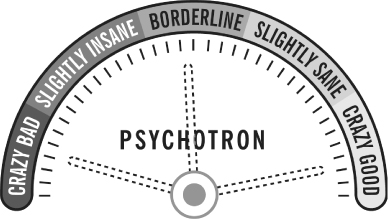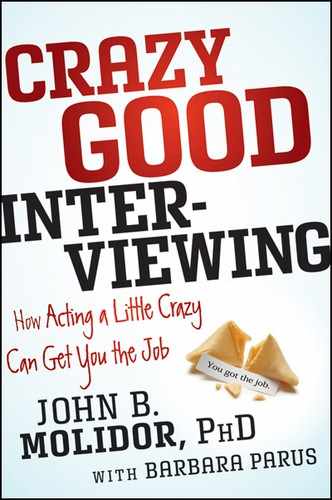Chapter 2
Go Crazy—In a Good Way
If you are new to job hunting, you are probably wondering where you can find reliable information about how to act on job interviews. If you are not new to job hunting, you probably have picked up some bad interview habits along the way, or you are reading some outdated information on interview techniques that has been collecting dust on your bookshelf. You need an interview strategy for today's job marketplace. Times have changed, and you need a competitive edge. Enter crazy good interviewing.
Crazy good interviewing is all about knowing what you should do and not do before, during, and after the interview. It's about getting psyched up—not acting crazy—so you can shine.
The interviewer will take the whole package into consideration during the interview. Your attire, mannerisms, voice inflection, facial expressions, hand gestures, and body language will be scrutinized, along with your answers, and the skills and work experience you bring to the position.
Will your interviewer give you high marks in the same way that audiences applaud seasoned pros like Tony Bennett, Michael Bublé, Christina Aguilera, Seal, and Lady Gaga? Or will your performance bomb from lack of preparation?
First, it is important to understand how your behaviors impact your interview ratings.
How Do You Rate?
The interviewing process often includes the use of rating scales that interviewers use to evaluate the quality of the interview and lead to some kind of recommendation of the candidate for the job in question. Ratings generally evaluate one or more of the following:
- Responses to individual questions.
- Job-related competencies that may or may not be linked to individual questions posed during the interview.
- The overall interview experience.
So, how do you determine what behaviors are acceptable or unacceptable in the crazy good interviewing process when you are responding to all of the interviewer's questions?
Introducing the “Psychotron”
Throughout this book, a measurement tool called a Psychotron will rate behaviors on a scale of “crazy bad” to “crazy good.” The Psychotron is based loosely on the National Superconducting Cyclotron Laboratory (NSCL) at Michigan State University (MSU), a world leader in nuclear science education and rare isotope research. More than 700 scientists from the United States and abroad have come to the NSCL, which is recognized for its nuclear physics research and innovations in accelerator design.
I am on the faculty at MSU, so let me brag and say that U.S. News and World Report ranks the MSU Nuclear Physics Program as number one in the nation. The NSCL at MSU operates two superconducting cyclotrons: the K500, which was the world's first cyclotron to use superconducting magnets, and the K1200, which is the highest-energy continuous beam accelerator in the nation. Using these and other related devices, scientists have learned more about the origins of the elements in the cosmos.
With that said, the cyclotron and the Psychotron have similarities other than the two terms sounding alike. The cyclotron accelerates particles and can smash these particles at high speeds into each other to create a reaction. This is similar to the interview process in which two people come together, typically at high speeds, with the goal of achieving some type of reaction, hopefully, a positive one. But not all interviews result in a reaction. If the interview stalls, the atoms (and people) do not create a reaction. Nothing happens. It's like being stuck in The Twilight Zone in the longest interview on earth with no exit. There's no engagement, no energy, no give-and-take, and no job offer.
How Does the Psychotron Work?
The Psychotron looks like a heat gauge, which registers the temperature ranging from cold (on the far left) to boiling hot (on the far right). Likewise, the Psychotron measures behaviors from crazy bad (cold on the far left) to crazy good (hot on the far right). The farther the arrow is to the left, the more crazy bad the behavior is. The farther the arrow is to the right, the more crazy good it is. Think of crazy good as being hot stuff.
Rate the Behavior

But the picture is not all black or white. Varying shades of gray craziness lie in between the two extremes. Many behaviors will be borderline, with the arrow pointing smack dab in the middle. In those cases, it is up to the interviewer to judge and decide.
Degrees of Craziness
- Crazy good: Candidate exhibits desirable positive behaviors.
- Slightly sane: There's hope for this candidate.
- Borderline: This behavior is the interviewer's judgment call.
- Slightly insane: Candidate is probably not dangerous, but beware.
- Crazy bad: Certifiably insane; get the straitjacket.
What's Crazy Bad Behavior?
A common complaint among many interviewers, especially older ones, hiring agents, and human resources professionals today is that younger job applicants—namely, those who fall under the Generation X and Generation Y labels—arrive completely unprepared or, worse yet, have a large sense of entitlement.
Though confidence is never a bad thing, you should not show up with the wrong attitude. Any negative behavior can be construed as crazy bad and jeopardize your chances of being viewed as a viable candidate and being considered for the job in question.
What constitutes crazy bad behavior? We are not talking about people who are certifiably insane or ready to be institutionalized even though some candidates may fit the description. Their behaviors simply exhibit a lack of common sense and propriety. Here are some strange, but true, examples. How would you rate each of them on the Psychotron?
Rate the Behavior

- Wearing a baseball cap backward, unless applying for the job of umpire.
- Checking your cell phone for voice mails and text messages.
- Asking how many young good-looking chicks or dudes work there.
- Asking the interviewer out on a date.
- Calling your interviewer Bob or Nancy, instead of Mr. Johnson or Ms. Green.
- Calling your interviewer Mr. Johnson, when his name is Mr. Jones.
- Discussing salary, vacation, and other benefits before an offer is extended.
- Laughing incessantly or uncontrollably.
- Inquiring about the company's drug testing policy.
- Recommending that the interviewer should not do a background check on you.
- Bad-mouthing your former employer or blaming a co-worker for your failures at your last job.
- Being overly concerned about the company's position on terminations.
- Dropping the “F” bomb and other swear words.
- Lighting up a cigarette or chewing tobacco.
- Yawning.
- Uttering monosyllabic responses to the interviewer's open-ended questions.
- Not providing thoughtful responses to the interviewer's questions.
- Reeking of alcohol.
- Acknowledging that you slacked on your last job.
- Exhibiting multiple personality disorder and introducing the “others.”
- Constant sniffing.
What's Crazy Good Behavior?
Crazy good behaviors are not over the top. Nowadays, being normal is enough to get a job in some cases, especially when the other candidates bombed in their interviews and exhibited some of the unacceptable behaviors listed above. For high-stakes positions, being prepared and thinking creatively can help you showcase your experience and qualifications in the best light and separate you from other well-qualified candidates.
Rate the Behavior

Here are some examples of common sense, crazy good behaviors. How would you rate each action on the Psychotron?
- Visit the company website before your interview to bone up on the organization.
- Prepare thoughtful questions to ask the interviewer.
- Wear attire that reflects your professionalism yet sets you apart from other candidates; for example, wear a tasteful, colorful tie for men, a chic scarf for women.
- Arrive 20 minutes early and be friendly and courteous to the person sitting at the reception desk.
- Greet the interviewer with a smile and a firm handshake.
- Know the top three traits you bring to the job and relate examples of each.
- Tell a real-life story that captures, personifies, and exemplifies the qualities and characteristics you will bring to the job.
- Use gestures that illustrate the key points you are making.
- Use self-effacing humor to describe lessons learned.
- Put together a DVD that highlights your abilities.
- Create a presentation on your iPad to show the interviewer what you would bring to the job.
- Compile a CD of songs that inspire you and explain why they motivate you.
- Showcase your skills and talents that pertain to the job; for example, bring samples of your award-winning published articles for a job that requires a lot of writing, or illustrations for a graphic design position.
- Recount your experience helping children at an orphanage in Guatemala.
- Describe your comeback after being seriously injured in a car accident.
- Identify lessons learned about teamwork as a crewmember in the Chicago Yacht Club race across Lake Michigan to Mackinac Island.
- Thank the interviewer for his/her time and follow up with a handwritten note.
Rate the Behavior

Using the Psychotron, how would you rate the behaviors of the job candidates in the following interviews on a scale from crazy bad to crazy good?
Three's a Charm
A job candidate, who was scheduled for a 9 a.m. interview for a sales position, was instructed to bring two forms of identification and three references. At 8:45 a.m., four women walked into the office. The interviewee informed the receptionist that she was scheduled for a 9 a.m. interview with Dr. Molidor. When asked who her three companions were, she said, “They are my references.”
Is this crazy bad behavior because the interviewee misunderstood the directive? Is it crazy good behavior because anyone who can persuade three people to accompany her to a morning interview must be a top-notch salesperson?
Nano Nano
When the job candidate entered the room, the interviewer invited him to have a seat. The candidate walked over to the chair, bent forward, and placed his head in the seat.
Is this crazy bad behavior because the interviewee must have been crazy? Is it crazy good behavior because it was a young actor named Robin Williams who was auditioning for the role of a space alien named Mork from Ork on Happy Days in 1974? When producer Gary Marshall asked him to sit down, Williams sat on his head. Marshall hired him because he was the only alien who auditioned for the part. The producers were so pleased with Williams' ad libbing that he did not have to stick to the scripts when Mork & Mindy was launched in 1978.
The Great Escape
When I asked the candidate how she came to apply for the job, she replied: “It was pouring rain and the wind raged around us. I overheard one of the men say, ‘Are you crazy? We can't make it in this weather. It's the monsoon season. We're already drenched like rats and freezing. And if we get caught, the men will be killed and the women and children tortured and maimed for sure.’
“The other man replied, ‘We have no choice. There is no turning back. We must go.’ Suddenly, a pair of hands lifted me onto a boat. Thus, at the age of six, I began my journey from Vietnam to the United States. I arrived not knowing a single word of English.
“So, if you are looking for someone who will bring determination, tenaciousness, and a sense of responsibility to this position, I know I am that person.”
Did the applicant exhibit crazy bad behavior because she chose to regale me with a heart-wrenching tale of her escape from Vietnam rather than focus on the position itself, or is it crazy good behavior because she painted a picture that captured the positive characteristics she developed as a result of her adversity?
